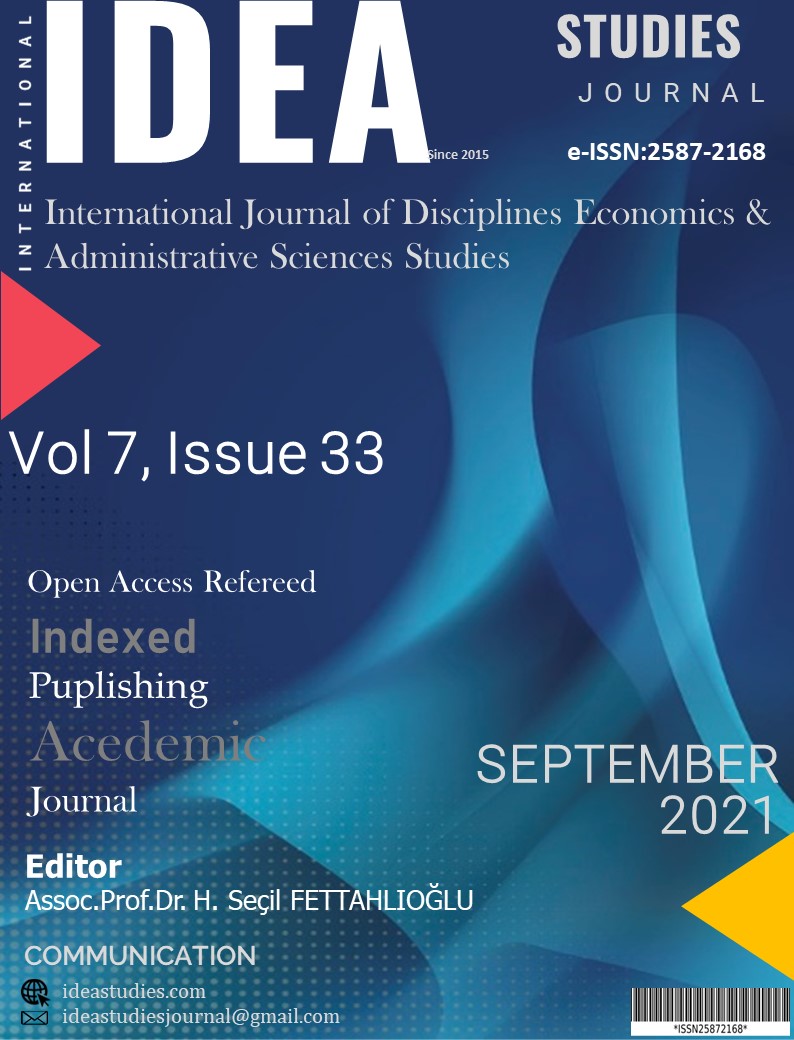Author :
Abstract
Özet “Kamu harcamaları mı ekonomik büyümenin nedenidir veya ekonomik büyüme mi kamu harcamalarının nedenidir?” soruları iktisat ve maliye literatüründe sıkça ele alınan önemli bir konudur. Bu bağlamda çalışmanın amacı kamu harcamaları ve dış ticaretin ekonomik büyüme üzerindeki etkisi olarak ifade edilebilir. Çalışmada literatürdeki birçok çalışmadan farklı olarak modele dış ticaret göstergeleri de dahil edilmiştir. Bu kapsam MINT ülkelerine ait verilerle 1987-2020 dönemi için ampirik uygulamalar gerçekleştirilmiştir. Yöntem olarak AMG uzun dönem katsayı tahmincisi ve Emirmahmutoğlu & Köse (2011) panel nedensellik testi kullanılmıştır. Elde edilen sonuçlara göre kamu harcamaları ve ithalatın ekonomik büyümeyi pozitif etkilediği görülmektedir. Nedensellik sonuçlarına göre ise ekonomik büyümeden kamu harcamalarına doğru bir nedensellik olduğu yani çalışmada Wagner Hipotezinin geçerli olduğu görülmüştür.
Keywords
Abstract
“Is public spending the cause of economic growth or is economic growth the cause of public spending?” questions are an important issue that is frequently discussed in the economics and finance literature. In this context, the aim of the study can be expressed as the effect of public expenditures and foreign trade on economic growth. In the study, unlike many studies in the literature, foreign trade indicators are also included in the model. In this context, empirical applications were carried out for the 1987-2020 period with the data of MINT countries. AMG long-term coefficient estimator and Emirmahmutoğlu & Köse (2011) panel causality test were used as a method. According to the results obtained, it is seen that public expenditures and imports affect economic growth positively. According to the causality results, it is seen that there is a causality from economic growth to public expenditures, that is, Wagner Hypothesis is valid in the study.
Keywords
- Altıner, A. (2019). OECD ülkelerinde kamu harcamaları ve ekonomik büyüme ilişkisi: Panel simetrik ve
- Altıner, A. (2019). OECD ülkelerinde kamu harcamaları ve ekonomik büyüme ilişkisi: Panel simetrik ve asimetrik nedensellik analizi. İktisadi ve İdari Bilimler Dergisi, 33(3), 849-871.
- Altunç, Ö. (2011). Kamu harcamalar ve ekonomik büyüme ilişkisi: Türkiye'ye ilişkin ampirik kanıtlar. Yönetim ve Ekonomi Dergisi, 18(2), 145-158.
- Arısoy, İ. (2005). Türkiyede kamu harcamaları ekonomik büyüme ilişkisi (1950-2003). Ankara: Türkiye Ekonomi Kurummu.
- Demir, C. (2019). Dışa açılma ve kamu harcamaları: OECD ülkeleri için panel veri analizi. Kırklareli Üniversitesi Sosyal Bilimler Dergisi, 3(2), 80-96.
- Dinç, D. (2019). Çin'in ekonomik büyüme ivme kaybı: İhracat-kamu harcamaları etkisi, Toda-Yamamotonedensellik testi. Erciyes Üniversitesi İktisadi ve İdari Bilimler Fakültesi Dergis, 54(Temmuz-Aralık), 461-Eberhardt, M. (2012). Estimating panel time-series models with heterogeneous slopes. The Stata Journal, 12(1), 61-71.
- Eberhardt, M., & Bond, S. (2009). Cross-section Dependence Nonstationary Panel Models: A Novel Estimator. Munich Personal RePEcs(17870).
- Eberhardt, M., & Teal , F. (2010). Productivity Analysis in Global Manufacturing Production. Discussion Paper 515,.
- Emirmahmutoğlu, F. (2011). Gelişmekte Olan Ülkelerde Para Krizlerinin Ekonometrik Analizi . Ankara.: Gazi Üniversitesi Sosyal Bilimler Enstitüsü Ekonometri Anabilim Dalı, Yayınlanmamış Doktora Tezi, .
- Emirmahmutoğlu, F., & Köse, N. (2011). Testing for granger causality in heterogeneous mixed panels. Economic Modelling, 28, 870-876.
- Güneş , H. (2020). Kamu harcamalarının ekonomik büyüme ve enflasyona etkisi: 28 OECD ülkesi için panel veri analizi. Yönetim, Ekonomi, Edebiyat, İslami ve Politik Bilimler Dergisi, 5(2), 1-15.
- Kamacı, A., & Kılıç, H. (2019). Kamu harcamalarının ekonomik büyüme ve işsizlik üzerindeki etkisi: OECD ülkeleri örenği. Politik Ekonomik Kuram, 1(3), 113-128.
- Kayhan, S., Adıgüzel, U., & Sökmen, F. Ş. (2016). Kamu harcamaları-Dış Ticaret İlişkisi: Birbirlerini aynı yönde mi etkiler? Türkiye örneği. ICPESS. İstanbul.
- Kiraz , H., & Gümüş, E. (2017). Kamu harcamalarının ekonomik büyüme üzerindeki etkisi: OECD ülkeleri üzerine bir araştırma. Finans Politik & Ekonomik Yorumlar, 54(631), 9-23.
- Oktayer, N., & Susam, N. (2010). Kamu harcamalar-ekonomik büyüme ilişkisi: 1970-2005 yılları Türkiye örneği. İktisadi ve İdari Bilimler Dergisi, 22(1), 146-167.
- Pesaran, M. (2004). General diagnostic tests for cross section dependence in panels. Cambridge Working Papers in Economics, No. 0435.
- Pesaran, M., & Yamagata, T. (2008). Testing slope homogeneity in large panels. Journal of Econometrics, 142(1), 50-93.
- Pesaran, M., Ullah, A., & Yamagata, T. (2008). A bias-adjusted LM test of error crosssection independence. Journal of Econometrics, 11(1), 105-127.
- Tülümce, S., & Zeren, F. (2017). Türkiye'de kamuharcamaları ve ekonomik büyüme arasındaki ilişkinin asimetrik nedensellik testi ile analizi. Uluslararası Yönetim İktisat ve İşletme Dergisi, 13(2), 299-313.
- Tütüncü, A., & Çifçi, R. (2021). Türkiye'de kamu harcamaları ve dışa açıklık ilişkisinin incelenmesi:Mekansal panel veri analizi. Erciyes Üniversitesi İktisadi ve İdari Bilimler Fakültesi Dergisi, 3(Mayıs- Ağustos), 17-36.
- Uzay, N. (2002). Kamu büyüklüğü ve ekonomik büyüme üzerindeki etkileri: Türkiye örneği (1970-1999). Erciyes Üniversitesi İktisadi ve İdari Bilimler Fakültesi Dergisi, 19(Temmuz-Aralık), 151-172.
- Ünsal, M. (2020). Kamu harcamaları, kamu gelirleri ve kamu borçlarının ekonomik büyüme üzerindekietkileri: OECD ülkeleri üzerine panel veri analizi. Dumlupınar Üniversitesi Sosyal Bilimler Dergisi, 64, 53-World Bank.. World Development Indicators:https://databank.worldbank.org/indicator/NE.EXP.GNFS.ZS/1ff4a498/Popular-Indicators# (01, 07 2021) Yerdelen Tatoğlu, F. (2017). Panel Zaman Serileri Analizi . İstanbul: Beta Yayınları.





